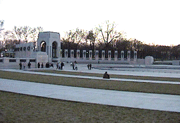Veterans remember joining war effort

The National World War II Memorial in Washington, D.C. was opened on April 29, 2004 and formally dedicated on one month later.
The veterans of World War II fought through cold winters, on strange islands, from beaches to forests; they sought to free many people across the globe.
In Europe, Hitler’s Third Reich formed concentration camps whose inhabitants were being put through extensive punishment and hundreds of thousands were being exterminated.
Across the globe in the Pacific Theatre, the Japanese had carved out an empire for themselves and formed work camps of their own. American soldiers put their lives on the line for the ideals of freedom and an end to oppression.
Men traveled thousands of miles to lands they had never seen before, to fight an enemy that was portrayed as beastly or less than human. In the Pacific Theatre, the Japanese soldier showed no sign of surrender – fighting to the death.
In Europe troops fought against an enemy that was systematically trying to wipe a race of humans off the planet. Without these heroes, the world would be a much different place.
These soldiers had many different reasons for joining the service. Each of these men made grave sacrifices when they joined the service.
“I graduated from high school in Wyandotte, Oklahoma in 1939,” said Leaford Bearskin, a retired Army Pilot, who is currently the chief of the Wyandotte Nation. “For some reason or other a long time ago, I always desired to be a pilot.
“I found out that you had to have two years college. I applied for entrance to a college, I was accepted. Just a few days later, I was in Miami, Oklahoma … I was walking in front of the post office, and I saw a great big sign there, and it had a man there pointing his finger at us, and it said ‘We want you for the flying cadets.”
Bearskin went into the office and talked to the recruiting officer, who told him he thought in the near future they would wave the college requirement.
So, Bearskin signed the papers and joined the Army Air Corps. He was sworn in to the Army Air Corps in September 1939.
Roy Anderson, a Saint Louis native, served in the United States Navy in the Pacific Theatre. He enlisted prior to being drafted.
“During World War II, when you turned 18, you automatically got drafted, and they put in a line Navy, Army, Marine Corps,” Anderson said. “So, I decided that I did not want to be in the Army. So, I went down and joined the Navy.”
Walter Walker served his country during the occupation of Japan after the end of World War II and fought in the Korean War. Today, Walker is lawyer in Neosho, where he has been practicing law for about 50 years.
“I joined the service in 1946 upon graduation from Joplin Junior College,” he said. “I was 18 my last semester in college, and they deferred me, as long as I promised them that I would enlist when I got out. Between when I consented to do that and the time I got ready to go, they had stopped the draft, but I enlisted anyway.”
After his return from the Korean War, he finished his law degree at the University of Missouri and returned to Neosho to practice law.
Raymond Crisman joined the Army and served in a maintenance battalion. He joined the service when he was 27 years old.
“I went down to the recruiter, and I told the recruiter that if he put me in the line of work that would do Uncle Sam the most good I would join that day,” Crisman said. “He said ‘Sign here.'”
Crisman owned an automotive electrical business in Joplin at the time. Today, he owns Roy’s Costume Shop on Seventh Street and is still active in the community, attending schools educating the youth about the war.
Every veteran has a different reason for joining the service. For most of them, they never thought twice about going to war for their country.
While I was in Portsmouth, England, I had the privilege of sitting down with five British veterans who fought in many of the same battles as the American veterans who I have interviewed over the past year.
I asked Jim Tuckwell, one of the British veterans, why he decided to go to war. His answer was simple.
“It was just something we did in those days,” Tuckwell said.
I heard similar responses from many of the American veterans as well. It was a time when the world needed heroes to step forward and join in the fight, and these people did what they needed to do. They did not worry about their own safety but were willing to do what was necessary to protect their way of life.
Your donation will support the student journalists of Missouri Southern State University. Your contribution will allow us to purchase equipment and cover our annual website hosting costs.



























